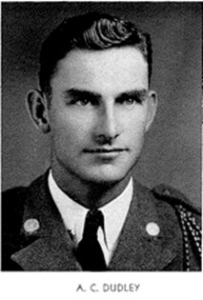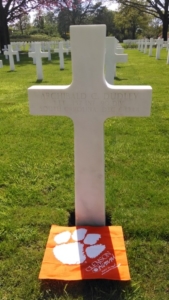Scroll of Honor – Archibald Carlisle Dudley
Patton’s Reply
Written by: Kelly Durham
It had seemed as if the Germans were on their last legs, as if they might be defeated and the war in Europe ended by Christmas of 1944. But the Allied offensive in Northern France was slowed by its very success; the more ground the Anglo-American forces gained, the longer their supply lines stretched and the more difficult it became to feed, fuel, and equip the advance. First Lieutenant Archibald Carlisle Dudley of Mullins was an infantry platoon leader in the van of the Allied assault.
of 1944. But the Allied offensive in Northern France was slowed by its very success; the more ground the Anglo-American forces gained, the longer their supply lines stretched and the more difficult it became to feed, fuel, and equip the advance. First Lieutenant Archibald Carlisle Dudley of Mullins was an infantry platoon leader in the van of the Allied assault.
Dudley was a vocational agricultural education major in Clemson’s Class of 1941. As a cadet, he participated in the campus chapter of Future Farmers of America and in the Dillon County Club. He marched with the Pershing Rifles drill team and attended ROTC summer training at Fort McClellan, Alabama where he qualified as a Marksman on the firing range. Dudley, who “was possessed of a sterling character and a wonderful personality,” married Ruby Allen of Walhalla and they had a daughter, Jeanne.
Dudley shipped overseas in October 1944. He was assigned to Company C of the 357th Infantry Regiment, 90th Infantry Division. The 90th was one of the divisions of General George Patton’s Third Army, which by the late autumn of 1944 had pushed the Germans back to their own territory.
The 357th was pulled out of the line and enjoyed a turkey dinner for Thanksgiving while in northern France. Soon thereafter, the regiment moved by truck to Colmen, just west of the French-German border. On Sunday November 26, the regiment attacked Furweiler, a small German town just east of the border. During the attack, the 357th came under fire from artillery emplacements on the Siegfried Line—the West Wall—a string of heavy defensive fortifications constructed on the east bank of the Saar River and designed to prevent the invasion of Germany from the west. It was apparent that the regiment would have to clear German forces from the area west of the river and then cross the Saar and assault the Siegfried Line itself.
The 357th launched its assault crossing of the Saar River in the early hours of Wednesday, December 6. During this action, First Lieutenant Dudley was reported missing in action. Dudley’s family, despite appeals to the Red Cross, could obtain no further information about its loved one.
When the war in Europe ended, General Patton was ordered back to the United States for leave with his family and also for public appearances to rally a war-weary public to continue to support the unfinished fight in the Pacific. Desperate for information about her missing brother, Nancy Dudley wrote to General Patton. In late August, Miss Dudley received a personal reply from the general.
According to General Patton, First Lieutenant Dudley and his platoon set out in boats to cross the Saar River at 0410 hours on December 6. Conditions were difficult at best, with the river swollen by seasonal rains and the temperatures very cold. Upon reaching the east bank of the Saar near Pachten, Germany at approximately 0425, Dudley was struck in the left shoulder and chest by enemy small arms fire. A medic administered first aid, but the fire from enemy pillboxes was so intense and the battle so “vicious” that Dudley could not be evacuated. According to Patton, at 0630 the area in which Dudley remained came under “a violent enemy artillery barrage.” Patton reported that the area was held until December 22, but that for the entire period it was under German small arms as well as indirect fire. As a result, Dudley “was among those many brave soldiers who were buried at night without lights or opportunity to read identification tags.” Patton went on to assure Miss Dudley that “there was always a chaplain to speak the last words.” He concluded his letter by congratulating her “on having a brother who did his duty even unto death.” 
First Lieutenant Archibald Carlisle Dudley was awarded the Purple Heart. He was survived by his wife Ruby, his daughter Jeanne, his mother, and three sisters. His body was recovered and buried at the Lorraine American Military Cemetery in France and is memorialized at Miller’s United Methodist Church Cemetery in Mullins.
For more information about Archibald Carlisle Dudley see:
https://soh.alumni.clemson.edu/scroll/archibald-carlisle-dudley/
For additional information about Clemson University’s Scroll of Honor visit:
https://soh.alumni.clemson.edu/
